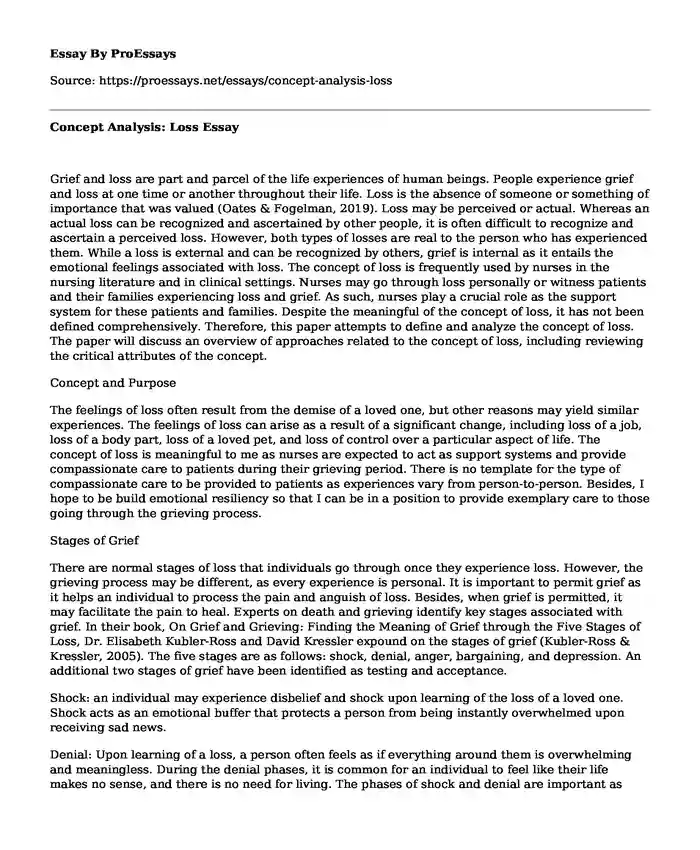Grief and loss are part and parcel of the life experiences of human beings. People experience grief and loss at one time or another throughout their life. Loss is the absence of someone or something of importance that was valued (Oates & Fogelman, 2019). Loss may be perceived or actual. Whereas an actual loss can be recognized and ascertained by other people, it is often difficult to recognize and ascertain a perceived loss. However, both types of losses are real to the person who has experienced them. While a loss is external and can be recognized by others, grief is internal as it entails the emotional feelings associated with loss. The concept of loss is frequently used by nurses in the nursing literature and in clinical settings. Nurses may go through loss personally or witness patients and their families experiencing loss and grief. As such, nurses play a crucial role as the support system for these patients and families. Despite the meaningful of the concept of loss, it has not been defined comprehensively. Therefore, this paper attempts to define and analyze the concept of loss. The paper will discuss an overview of approaches related to the concept of loss, including reviewing the critical attributes of the concept.
Concept and Purpose
The feelings of loss often result from the demise of a loved one, but other reasons may yield similar experiences. The feelings of loss can arise as a result of a significant change, including loss of a job, loss of a body part, loss of a loved pet, and loss of control over a particular aspect of life. The concept of loss is meaningful to me as nurses are expected to act as support systems and provide compassionate care to patients during their grieving period. There is no template for the type of compassionate care to be provided to patients as experiences vary from person-to-person. Besides, I hope to be build emotional resiliency so that I can be in a position to provide exemplary care to those going through the grieving process.
Stages of Grief
There are normal stages of loss that individuals go through once they experience loss. However, the grieving process may be different, as every experience is personal. It is important to permit grief as it helps an individual to process the pain and anguish of loss. Besides, when grief is permitted, it may facilitate the pain to heal. Experts on death and grieving identify key stages associated with grief. In their book, On Grief and Grieving: Finding the Meaning of Grief through the Five Stages of Loss, Dr. Elisabeth Kubler-Ross and David Kressler expound on the stages of grief (Kubler-Ross & Kressler, 2005). The five stages are as follows: shock, denial, anger, bargaining, and depression. An additional two stages of grief have been identified as testing and acceptance.
Shock: an individual may experience disbelief and shock upon learning of the loss of a loved one. Shock acts as an emotional buffer that protects a person from being instantly overwhelmed upon receiving sad news.
Denial: Upon learning of a loss, a person often feels as if everything around them is overwhelming and meaningless. During the denial phases, it is common for an individual to feel like their life makes no sense, and there is no need for living. The phases of shock and denial are important as they help an individual to cope and survive the loss. Denial allows a grieving person to pace the experience of loss. In essence, denial is nature's way of handling feelings that can be dealt with. However, denial does not imply denying the reality of a loss, it is often regarded to mean denying the emotions associated with the loss. Once a person accepts the reality of the loss, denial diminishes, and then it becomes possible to progress into the healing process.
References
Kubler-Ross, E., & Kessler, D. (2005). On grief and grieving: Finding the meaning of grief through the five stages of loss. Simon and Schuster.
Oates, J. R., & Maani-Fogelman, P. A. (2019). Nursing Grief and Loss. Retrieved from https://www.ncbi.nlm.nih.gov/books/NBK518989/#!po=81.0345
Cite this page
Concept Analysis: Loss. (2023, Dec 13). Retrieved from https://proessays.net/essays/concept-analysis-loss
If you are the original author of this essay and no longer wish to have it published on the ProEssays website, please click below to request its removal:
- Research Paper on Feminism and Marxism in the Brave New World
- Literary Analysis Essay on Celia by Ben Johnson
- Essay Sample on Troy Maxson: Hero or Villain?
- The Legend of Sleepy Hollow Summary and Analysis Essay
- U.S. Government's Responsibility to Protect Citizens & Promote Justice.
- The Impact of Human-Generated Noise on Aquatic Animals: A Growing Concern.
- Concept Analysis: Loss







